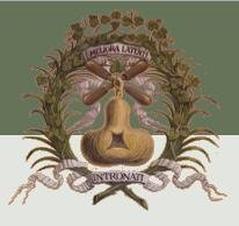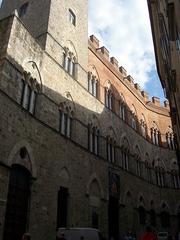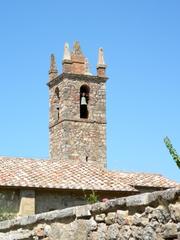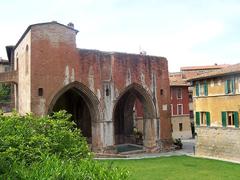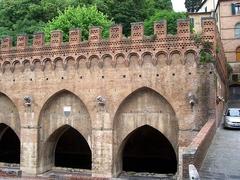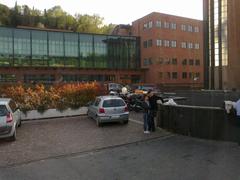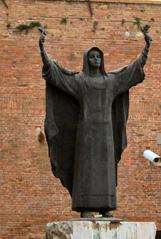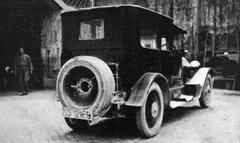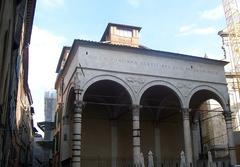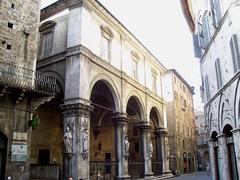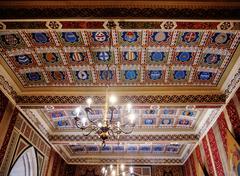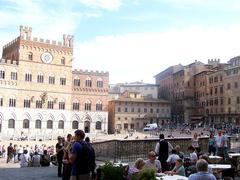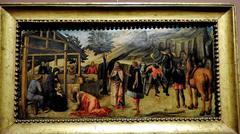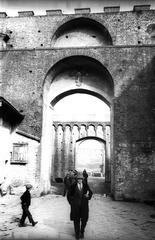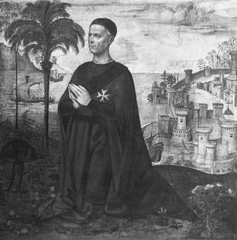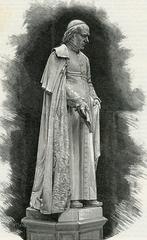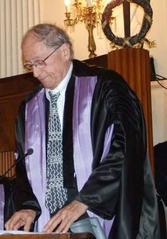Siena Historic Centre Visiting Hours, Tickets, and Travel Guide
Date: 04/07/2025
Introduction to Siena Historic Centre and Its Significance
Nestled in the heart of Tuscany, the Historic Centre of Siena stands as a remarkable testament to medieval urbanism, rich cultural heritage, and artistic brilliance. Recognized as a UNESCO World Heritage Site since 1995, Siena enchants visitors with its labyrinthine streets, striking Gothic architecture, and vibrant traditions, including the world-renowned Palio di Siena horse race. Founded on ancient Etruscan and Roman roots, Siena flourished in the Middle Ages as a powerful city-state, shaping its unique urban layout and architectural identity that continue to define its charm today. Iconic landmarks such as the shell-shaped Piazza del Campo, the majestic Siena Cathedral (Duomo di Siena), and the towering Torre del Mangia encapsulate centuries of history and artistic achievement.
Travelers to Siena can immerse themselves in the legacy of the Sienese School of painting, admire frescoes illustrating medieval political philosophy, and explore the 17 contrade—distinct districts integral to the city’s social fabric and cultural events. Complementing its historical and artistic treasures, Siena offers a rich culinary tradition rooted in Tuscan flavors, with specialties like pici pasta and panforte.
This comprehensive guide provides essential information for travelers, including visiting hours and ticketing details for key monuments, accessibility considerations, travel tips, and insights into local customs and festivities. Whether you are drawn by medieval splendor, the excitement of the Palio, or the warm embrace of Tuscan hospitality, Siena promises an unforgettable journey through Italy’s past and present. For more information, see UNESCO World Heritage, Everything Everywhere, and Full Suitcase.
Discover the Historic Centre of Siena: A Medieval Gem in Tuscany
The Historic Centre of Siena is a captivating destination, rich in history, culture, and architectural splendor. This guide explores Siena’s origins, its artistic legacy, and provides essential visitor information, including visiting hours, ticketing, accessibility, and travel tips to ensure a memorable visit to this UNESCO World Heritage Site.
Origins and Medieval Development of Siena
Siena’s history dates back to ancient times, with archaeological evidence of Etruscan settlements from as early as 900 BCE (History Hit). The city later became a Roman colony named Saena Julia. Legend attributes its founding to Senius and Aschius, sons of Remus, lending Siena a mythical Roman heritage (UNESCO).
The city’s medieval ascent began in the 12th century as it flourished through trade, banking, and the arts. Its location along the Via Francigena pilgrimage route spurred economic growth and cultural exchange (Everything Everywhere). By the 13th century, Siena was a powerful city-state governed by the Monte dei Nove (Council of Nine), who fostered civic pride and ambitious urban planning (History Tools).
Urban Planning and Architectural Identity
Siena’s cityscape reflects its medieval ambitions and rivalry with Florence. The layout is characterized by narrow, winding streets and steep alleys, designed for defense and to promote civic identity (UNESCO). The unique shell-shaped Piazza del Campo, radiating from the city’s heart, showcases medieval urban planning (Visit Italy).
Warm reddish-brown brick, known as “Sienese” stone, unifies the historic centre’s appearance (Everything Everywhere). Preservation of this architectural integrity was a key factor in Siena’s UNESCO designation.
Artistic Legacy and the Sienese School
The Sienese School of painting, with masters such as Duccio di Buoninsegna, Simone Martini, and the Lorenzetti brothers, flourished during the 13th and 14th centuries (UNESCO). Their vibrant, expressive works adorn Siena’s churches and public buildings, influencing Italian and European art.
The Siena Cathedral (Duomo di Siena), constructed between 1215 and 1263, stands as a masterpiece of Italian Gothic architecture, featuring a façade of intricate white and dark green marble and an interior adorned with works by Donatello, Bernini, and Michelangelo (History Tools). The cathedral’s elaborate marble floor, composed of 56 inlaid panels, is revealed only a few months each year.
The Palazzo Pubblico, Siena’s medieval town hall, houses the Museo Civico with frescoes by Simone Martini and Ambrogio Lorenzetti, including the renowned “Allegory of Good and Bad Government,” a milestone in medieval political thought (History Tools).
Civic Identity and the Palio di Siena
Siena’s identity is intertwined with the Palio di Siena, a biannual horse race each July and August in Piazza del Campo (Tours to Turkey). The event features fierce competition among the city’s 17 contrade (districts), each with its own colors and symbols. The bareback race, the climax of elaborate pageantry and neighborhood festivities, unites Siena in a vibrant display of local pride (1xMarketing).
Participation in the Palio is a profound honor, reinforcing community bonds and preserving centuries-old traditions. For visitors, witnessing the Palio is a unique window into Siena’s living heritage.
Economic and Financial Heritage
Siena’s historical importance extends to finance, housing the Monte dei Paschi di Siena, established in 1472 and recognized as one of the world’s oldest banks (History Tools). Its Gothic Palazzo Salimbeni headquarters underscores the city’s economic legacy. Renaissance financial institutions funded many of Siena’s grand palaces, churches, and public works.
Visitor Information: Historic Centre of Siena
Visiting Hours
- Piazza del Campo & City Streets: Open to the public 24/7.
- Siena Cathedral (Duomo di Siena): Typically open daily from 10:30 AM to 7:00 PM; hours may vary seasonally.
- Palazzo Pubblico & Civic Museum: Usually open from 10:00 AM to 6:00 PM.
Note: Hours can change for special events or holidays; consult official websites before visiting.
Tickets and Prices
- Siena Cathedral: Entrance fee about €8–€10; combined tickets may be available for the cathedral, museum, and crypt.
- Palazzo Pubblico: Admission approximately €10.
- Guided Tours: Prices vary; advance booking is advised.
Accessibility
- The medieval layout means narrow, uneven streets and cobblestones, which may be challenging for visitors with mobility issues.
- Some attractions offer limited wheelchair access—check in advance.
Travel Tips
- Purchase tickets online to avoid queues, especially during peak tourist seasons and the Palio.
- Visit early or late in the day for fewer crowds and better photography.
- Wear comfortable shoes suitable for cobblestones and inclines.
Nearby Attractions
- Basilica of San Domenico: Home to relics of St. Catherine of Siena.
- Museo dell’Opera del Duomo: Hosts sculptures and artworks from the cathedral.
- Pinacoteca Nazionale: Features Renaissance paintings, including works by the Sienese School.
Frequently Asked Questions (FAQ)
Q: What are the visiting hours for the Historic Centre of Siena?
A: The city is accessible at all times. Key attractions like the Cathedral and Palazzo Pubblico are generally open between 10 AM and 7 PM.
Q: How can I buy tickets for Siena’s attractions?
A: Tickets are available online via official museum websites or on-site. Online booking is recommended.
Q: Are there guided tours of the Historic Centre?
A: Yes, many guided tours focus on Siena’s history, art, and architecture. Book ahead for popular times.
Q: When is the Palio di Siena held?
A: Each year on July 2nd and August 16th.
Q: Is the Historic Centre wheelchair accessible?
A: Accessibility is limited due to the medieval layout; check individual sites for specific access details.
Urban Layout and Architectural Character
Siena’s historic centre displays medieval urban planning, shaped by its hilly topography and centuries of civic evolution. The city sits atop three hills, forming a Y-shaped layout with winding, sloping streets converging at Piazza del Campo (Scribd; UNESCO World). The city’s double walls, gates like Porta Camollia and Porta Romana, and the 27-kilometre “bottini” aqueduct system are still visible and functional (Eupedia; Florence Tips).
The centre is divided into 17 contrade, each with its own emblem, traditions, and community identity. Key thoroughfares—Via di Città, Via dei Montanini, Via Banchi di Sopra, and Via Camollia—are lined with historic palazzi, shops, and eateries (Full Suitcase). Siena’s compactness makes it highly walkable, though visitors should be prepared for inclines and cobblestones.
Architectural Styles
Siena’s buildings, mainly from the 12th to 15th centuries, are characterized by red brick, local stone, and polychrome marble (Architecture of Cities; UNESCO World). The Sienese Gothic style is visible in religious and civic buildings, most notably the Cathedral of Santa Maria Assunta (Duomo di Siena) with its black-and-white striped marble and ornate mosaics (The Crazy Tourist; Florence Tips). The Palazzo Pubblico and Torre del Mangia, as well as noble palazzi such as Palazzo Chigi-Saracini and Palazzo Patrizi, represent Siena’s secular Gothic grandeur.
Must-See Historical Sites
- Piazza del Campo: The heart of Siena, renowned for its shell shape and as the site of the Palio (Florence Tips; UNESCO World).
- Siena Cathedral (Duomo di Siena): Masterpiece of Italian Gothic with works by Donatello, Michelangelo, and Bernini (The Crazy Tourist).
- Hours: 10:30 AM–7:00 PM (seasonal variations).
- Tickets: ~€15 for combined complex access.
- Torre del Mangia: 102 meters high, offering panoramic city views (Eupedia).
- Hours: 10:00 AM–7:00 PM.
- Tickets: ~€10.
- Palazzo Pubblico & Museo Civico: Gothic town hall with Lorenzetti’s frescoes (UNESCO World).
- Hours: Tues–Sun, 9:00 AM–7:00 PM.
- Tickets: ~€9, with combined ticket options.
- Contrade Museums & Churches: Each of Siena’s 17 contrade maintains its own museum and church (Eupedia).
- Basilica of San Domenico: Gothic church with relics of St. Catherine.
- Baptistery of San Giovanni: Renaissance sculptures, included in Duomo ticket.
- Pinacoteca Nazionale: Sienese School masterpieces (UNESCO World).
- Hidden Gems: Orto de’ Pecci (community garden) and Loggia della Mercanzia.
Special Events: The Palio di Siena
The Palio di Siena, held on July 2 and August 16, is a historic bareback horse race embodying centuries-old civic pride and rivalry among the contrade (italyscapes.com). The event includes a week of rituals—horse assignments, trial races, blessings, and the Corteo Storico parade. Tickets for seating and balcony views must be booked months in advance (radicalstorage.com). Standing room in the Piazza is free but extremely crowded.
Accessibility and Visitor Tips
- Navigation: The centre is pedestrianized; wear sturdy shoes (Full Suitcase).
- Accessibility: Main sites offer partial access; contact venues ahead for assistance.
- Guided Tours: Book walking tours or use audio guides for deeper insights.
- Parking: Use lots outside city walls; driving inside is restricted.
- Dining: Sample local dishes like pici pasta and panforte (This Way to Italy).
- Photography: Top spots include Torre del Mangia and Piazza del Campo at sunset.
Local Cuisine in Siena
Siena’s culinary scene emphasizes simple, high-quality Tuscan ingredients:
- Signature Dishes: Pici all’aglione, Cinta Senese pork, ribollita, panforte, ricciarelli, and cantucci with Vin Santo (This Way to Italy).
- Notable Restaurants: Osteria Le Logge, Osteria La Sosta di Violante, Oro di Siena, Particolare di Siena, Torrefazione Fiorella, Caffé A. Nannini (Enjoy Tuscany; Anywhere We Roam).
- Wine: Sample Chianti Classico and Brunello di Montalcino at local enotecas.
Exploring Beyond the Centre
- Atmospheric Streets: Via dei Rossi, Via Camollia, and Porta Romana offer local color (Anywhere We Roam).
- Day Trips: Chianti, San Gimignano, Monteriggioni, Montalcino, and Pienza are all within easy reach.
- Practical Transport: Arrive by train or bus; park outside the city walls.
Visitor FAQs
Q: What are Siena Cathedral’s visiting hours?
A: Typically 10:30 AM–5:00 PM; check the official site for seasonal changes.
Q: How do I buy tickets for Torre del Mangia?
A: At the Palazzo Pubblico or online via official tourism portals.
Q: When is the best time to visit Siena?
A: Spring and early autumn for pleasant weather and fewer crowds.
Q: Are guided tours available?
A: Yes, covering history, food, and wine.
Q: Is Siena accessible for mobility-challenged visitors?
A: Major sites provide wheelchair access, though cobblestones remain a challenge.
Conclusion
The Historic Centre of Siena is a living mosaic of medieval architecture, artistic mastery, and enduring traditions. From the majestic Cathedral to the thrilling Palio di Siena, every corner invites visitors into a story centuries in the making. With practical information on visiting hours, ticketing, and accessibility, complemented by authentic Tuscan cuisine and nearby attractions, Siena is both a cultural jewel and a gateway to the wonders of Tuscany.
For the latest updates and detailed planning, consult official tourism resources and consider the Audiala app for personalized travel assistance.
Official Siena Tourism Website and Other Credible Sources
- Historic Centre of Siena: Visiting Hours, Tickets, and Top Historical Sites in Siena, 2025, History Hit
- Historic Centre of Siena, UNESCO World Heritage Centre, 2025
- Everything Everywhere, Historic Centre of Siena UNESCO World Heritage Site, 2025
- Siena Historic Centre: Visiting Hours, Tickets, and Must-See Historical Sites, 2025, Full Suitcase
- Palio di Siena Tickets and Visiting Hours: Exploring Siena’s Contrade, Historical Sites, and Local Traditions, 2025, Terre di Siena
- Complete Visitor Guide to Siena Historic Centre: Visiting Hours, Tickets, and Local Cuisine, 2025, Anywhere We Roam
- Discover Tuscany, Tips for the Palio, 2025
